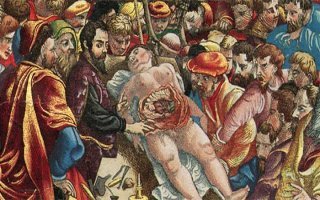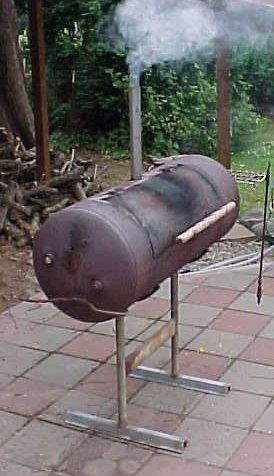

¶ I confess. I can't help composing this stuff in the middle of the night, next my lovely wife asleep. No pebbles on the ocean of truth’s beach, these irrefragable boulders line the dry canyons of doubt scattered here and there across my life. How’s that for fancy writing?
¶ This is better: Lately when I retired to my home, determined so far as possible to bother about nothing except spending the little life I have left in rest and seclusion (my 8th decade is now closing), it seemed to me I could do my mind no greater favor than to let it entertain itself in full idleness and stay and settle in itself, which I hoped it might do more easily now, having become weightier and riper with time. But I find that on the contrary, like a runaway horse, it gives itself a hundred times more trouble than it took for others, and gives birth to so many chimeras and fantastic monsters, one after another, without order or purpose, that in order to contemplate their ineptitude and strangeness at my pleasure, I have begun to put them in writing, hoping in time to make my mind ashamed of itself. -- Michel de Montaigne, I:8
¶ The priests of Amen-Ra at Thebes in Egypt . . . regularly burnt a wax figure of the fiend Apep, who daily endeavored to prevent the sun from rising. This figure was in the form of a serpent of many folds, on which the name Apep was written or cut. A case made of papyrus inscribed with spells containing curses was prepared, and the wax figure having been placed inside it, both case and figure were cast into a fire made of a special kind of plant. Whilst they were burning the priest recited curses, and stamped upon them with his left foot until they were rendered shapeless and were finally destroyed. –Frazer-Gaster, New Golden Bough, 37-38.
One day a traveler, weary from a long and dangerous journey, appeared in the Pharaoh’s court at Thebes. Received with surprise and curiosity, he was given care to recover from his exertions. Scholars able to converse with him were found, and with time he was introduced to the grandeurs and observances of the court. Thus he fell into discussion with the sunrise priest.
“In my far-distant country,” said the guest, “we take no special precautions as to the laws ruling the heavens. I see now, indeed, that compared to your science and wisdom we are but an ignorant folk. Truly, this meticulous rite--it is necessary, is it, that the sun can rise every day?”
The priest nodded gravely. "It never fails,” he said.
¶ The neurologist Oliver Sacks reports (in An Anthropologist on Mars) the case of a youth who became ever more rebellious and dysconventional. He progressed through several street cults to residence in the temple of a sect whose aspirants revered him for his elliptic, semi-comatose converse as having attained what they enshrined as sainthood. In fact a massive tumor had crowded out much of his brain. ¶ In 1960 an American astronomer named Frank Drake became the first person to conduct a sensitive radio search for signals from extraterrestrial civilizations. . . . Jill Tarter, who has dedicated her career to SETI, says “the Drake equation is a wonderful way to organize our ignorance.” --Joel Achenbach, Life Beyond Earth, in Timothy Ferris, Best American Science Writing 2001, 26. The Drake equation:
Okay. This universe does bring forth what we call intelligent life. Being it, we can't deny it. R* leaves us with the ridiculously small probability of having this marvel all to ourselves. More trouble is in the L. We know now that when an organism thinks it has got control of its substrate, it winks out of existence in a cosmic instant. Doing it, we can't deny it. That last term is essentially zero. Hello out there, and farewell. The human species is, in a word, an environmental abnormality. Perhaps a law of evolution is that intelligence usually extinguishes itself. — E.O. Wilson, in Carol Ann Bassett, Galapagos at the Crossroads, 43. David Toomey serves up this whole salad of improbabilities in Weird Life (Norton, 2013).
¶ Although just pious, E. F. Schumacher in his Guide for the Perplexed accidentally got profound. He distinguished two kinds of knowledge: one, the familiar sort, is extremely valuable, so people who have it always try to keep it secret. The other kind isn’t worth anything, so those who own it are always trying to give it away. He didn’t seem to know it’s what we call wisdom. ¶
N=R*fpneflfIfcL:
N - number of signals
R* - number of stars in the universe
fp - fraction of stars with planets
ne - with habitable environment
fl - fraction with life
fi - fraction with intelligence
fc - fraction communicating
L - longevity of communicators

¶ Jane Brown, [a] London headmistress, . . . in 1993 forbade a school visit to a performance of Romeo and Juliet—on the grounds that the play was politically incorrect (“blatantly heterosexual” in her words). –Tony Judt, Postwar, 778-9.
¶ Drifiting away from the church as a career . . . did not necessarily call into question Darwin's faith in an original Creator. Darwin always insisted that he believed in some form of God throughout the Beagle voyage and for a period beyond. In his Autobiography Accepting the basic story of Christianity was much easier than grappling with doubt. For Darwin, as for countless others, belonging to the Church of England was as much a statement of social position and attitude as it was a profession of any particular doctrine--particularly so for the liberal, gentrified section of society to which Darwin belonged. He used to say he had been so orthodox on the voyage that he was laughed at by some of the officers for quoting the Bible as an unanswerable authority on a point of morality: "I suppose it was the novelty of the argument that amused them." Janet Browne, Charles Darwin: Voyaging, 325.
Accepting the basic story of Christianity was much easier than grappling with doubt. For Darwin, as for countless others, belonging to the Church of England was as much a statement of social position and attitude as it was a profession of any particular doctrine--particularly so for the liberal, gentrified section of society to which Darwin belonged. He used to say he had been so orthodox on the voyage that he was laughed at by some of the officers for quoting the Bible as an unanswerable authority on a point of morality: "I suppose it was the novelty of the argument that amused them." Janet Browne, Charles Darwin: Voyaging, 325.
¶ [Darwin] wondered at what he called "the impossibility of conceiving this immense and wonderful universe, including man . . . as the result of blind chance or necessity. When thus reflecting I feel compelled to look to a First Cause having an intelligent mind in some degree analogous to that of man and I deserve to be called a Theist. But then arises the doubt, can the mind of man, which has, as I fully believe, been developed from a mind as low as that possessed by the lowest animal, be trusted when it draws such grand conclusions?" --Timothy Ferris, The whole Shebang, 202.
¶ It's as well for all antagonists in these counter-crusades to remember that believing, however scientifically or sincerely, that supernatural beings or forces do not exist differs neither in degree, kind, nor proof from religious belief that they do. Have we no option but to kill each other?

 Very few animals live in patrilineal, male-bonded communities wherein females routinely reduce the risks of inbreeding by moving to neighboring groups to mate. And only two animal species are known to do so with a system of intense, male-initiated territorial agression, including lethal raiding into neighboring communities in search of vulnerable enemies to attack and kill. Out of four thousand mammals and ten million or more other animal species, this suite of behaviors is known only among chimpanzees and humans. –Richard Wrangham, Demonic Males, 24.
Very few animals live in patrilineal, male-bonded communities wherein females routinely reduce the risks of inbreeding by moving to neighboring groups to mate. And only two animal species are known to do so with a system of intense, male-initiated territorial agression, including lethal raiding into neighboring communities in search of vulnerable enemies to attack and kill. Out of four thousand mammals and ten million or more other animal species, this suite of behaviors is known only among chimpanzees and humans. –Richard Wrangham, Demonic Males, 24.
¶ An anthropologist once told me about two Eipo-Papuan village heads in New Guinea who were taking their first trip on a little airplane. They were not afraid to board the plane, but made a puzzling request: they wanted the side door to remain open. They were warned that it was cold up in the sky and that , since they wore nothing but their traditional penis sheaths, they would freeze. The men didn’t care. They wanted to bring along some heavy rocks, which, if the pilot would be so kind as to circle over the next village, they could shove through the open door and drop onto their enemies. – Frans de Waal, Our Inner Ape, 129-30.

¶  Once he calms down, Kanzi squeaks something at Sue and then leaves the room. She tells me he wants to show me his new lexigram . . . Sue believes bonobos use a type of language to communicate with each other in the same way in the jungle. In a blind test experiment to judge the extent of bonobo vocalization, she placed Kanzi and Panbanisha in separate rooms; they could hear each other but not see each other. Kanzi was told he was to be given yogurt by using the appropriate symbol on the silent lexigram. He was verbally asked to announce this to Panbanisha. “Kanzi vocalized, then Panbanisha vocalized in return and selected 'yogurt’ on the silent keyboard in front of her,” Sue says. She mentioned different foods to Kanzi such as peanut, tomato, egg, and banana, and unfailingly Panbanisha recognized his bonobo vocalization for the food type chosen and pressed the correct lexigram. Paul Raffaele, Among the Great Apes, 175-76. I wrote to Dr. (Sue) Savage-Rumbaugh to ask whether she had tried to imitate the squeaks Kanzi was making (she understands his talk), but no answer as yet. Kanzi understands much spoken English, but can't make the sounds, so he translates English into Kanzish, or rather Bonobish, which of course both he and his half-sister speak. I say they could teach us to speak Bonobish. Irene Pepperberg had a like chance when Alex (Alex and me) tried to teach her some Agrapish ("banerry," African Gray Parrot-ish for a fruit he didn't know in English). I don't buy the argument that other species haven't the anatomy for speech. Buford, a mynah that lived with my sister, could set the family in turmoil with remarks and commands quite indistinguishable from their own patois.
Once he calms down, Kanzi squeaks something at Sue and then leaves the room. She tells me he wants to show me his new lexigram . . . Sue believes bonobos use a type of language to communicate with each other in the same way in the jungle. In a blind test experiment to judge the extent of bonobo vocalization, she placed Kanzi and Panbanisha in separate rooms; they could hear each other but not see each other. Kanzi was told he was to be given yogurt by using the appropriate symbol on the silent lexigram. He was verbally asked to announce this to Panbanisha. “Kanzi vocalized, then Panbanisha vocalized in return and selected 'yogurt’ on the silent keyboard in front of her,” Sue says. She mentioned different foods to Kanzi such as peanut, tomato, egg, and banana, and unfailingly Panbanisha recognized his bonobo vocalization for the food type chosen and pressed the correct lexigram. Paul Raffaele, Among the Great Apes, 175-76. I wrote to Dr. (Sue) Savage-Rumbaugh to ask whether she had tried to imitate the squeaks Kanzi was making (she understands his talk), but no answer as yet. Kanzi understands much spoken English, but can't make the sounds, so he translates English into Kanzish, or rather Bonobish, which of course both he and his half-sister speak. I say they could teach us to speak Bonobish. Irene Pepperberg had a like chance when Alex (Alex and me) tried to teach her some Agrapish ("banerry," African Gray Parrot-ish for a fruit he didn't know in English). I don't buy the argument that other species haven't the anatomy for speech. Buford, a mynah that lived with my sister, could set the family in turmoil with remarks and commands quite indistinguishable from their own patois.
¶ Much has been made of how genetically similar we and chimps are. Jeremy Taylor in Not a Chimp (Oxford 2009) holes that theory below the waterline by reviewing recent biochemical work on gene expression, which can account for a lot of the very significant difference.
¶ From the early days of evolutionary anthropology to today’s textbooks in evolutionary psychology, the tendency has been to devote more space to aggression and our “killer instincts” or to emphasize “demonic” chimpanzeelike tendencies for males to join with other males in their group to hunt neighboring groups and intimidate, beat, torture, and kill them. . . . Mothers and Others is about the emergence of a particular mode of child-rearing known as “cooperative breeding” and its psychological implications for apes in the line leading to Homo sapiens. . . . Published 150 years after Darwin’s Origin of Species, this book, like the far greater one that inspired it, is written as “one long argument.” . . . [it] is an attempt to reconstruct long ago events detailing the emergence of emotionally modern humans, step by Darwinian step. — Sarah Blaffer Hrdy (2009), 19, 30-32. Having quarantined Wrangham and school in quotes, Hrdy traces a family child-rearing history that mainly calls on aunts, grandmothers, big sisters, and other distaffs, leaving the guys pretty much free to act as chimplike as ever.
¶ Once in my life, about 40 years ago, I published something in an American newspaper. For
Adolf Wilbrandt’s 70th birthday, the German-language New-Yorker Staatszeitung printed an essay by me, his biographer. When I laid eyes on the sample copy, from that moment on, for all time, the very image of the American press stood before me in its entirety. . . . Down through the middle of my Wildbrandt article, splitting the lines zig-zag from top to bottom, was an ad for a laxative, beginning with the words “Man Has 30 Feet of Gut.” –Viktor Klemperer, LTI (1997), 73.
¶ Phrenology and physiognomy, be it observed, disappoint you often amongst civilised people, the proper action of whose brain upon the features is impeded by the external pressure of education, accident, example, habit, and necessity. But they are tolerably safe guides when groping your way through the mind of man in his so-called natural state, a being of impulse, in that chrysalis condition of mental development which is rather instinct than reason. –Sir Richard Francis Burton, Pilgrimage, I, 17.-- external pressure of education--isn't that great? Burton knew continentfuls of peoples who proof themselves with doctrine against any education whatever.
¶ In the eyes of [Casey Ruud, Hanford security foreman who had found the leaking waste tanks], and many others, the federal government had asked Rockwell to make plutonium without the funding necessary to meet every safety and environmental concern. Although it was official policy that Hanford comply with NQA-1 [Nuclear Quality Assurance Standard], the government didn't press the issue because compliance was practically impossible. And although an order invoking NQA-1 [which by law Ruud could give] would shut down Hanford, this wasn't just a matter for local concern. Ruud was messing with the geopolitics of the Reagan administration, which was using its nuclear buildup to pressure the Soviet Union into concessions at strategic arms reduction talks. If the production line at Hanford stopped, the entire nuclear arms complex would be affected. --Michael D'Antonio, Atomic Harvest, 156. Well, what would you have done? The resulting plume of radioactive groundwater will eventually reach the Columbia River. Send me your solution: stavenhagen at stavenhagen.net.
¶  In the 11th century, St. Peter Damian preaches a required period of twenty-five years fasting and penance for married couples over the age of twenty who have indulged in ‘deviant’ sexual positions. . . one late medieval theologian went so far as to say that God had sent the biblical Flood because he’d espied a couple doing sex with the woman on top. –Brittany Hughes, Helen of Troy, 145. What so upset God was the spectacle of his lordly male knocked flat by a mere female, bit of his own rib, and worse, enjoying it.
In the 11th century, St. Peter Damian preaches a required period of twenty-five years fasting and penance for married couples over the age of twenty who have indulged in ‘deviant’ sexual positions. . . one late medieval theologian went so far as to say that God had sent the biblical Flood because he’d espied a couple doing sex with the woman on top. –Brittany Hughes, Helen of Troy, 145. What so upset God was the spectacle of his lordly male knocked flat by a mere female, bit of his own rib, and worse, enjoying it.
¶  Andreas Vesalius published his revelations about human anatomy, On the Fabric of the Human Body in 1543—the same year as Copernicus's on the Revolutions of the Heavenly Spheres, and with just as much affront to Aristotle. . . . Vesalius . . . had also staged sensational popular demonstrations showing the male and female skeletons to contain the same number of ribs, thus defying the widespread belief, based on the Book of Genesis, that men came one rib short. –Dava Sobel, Galileo's Daughter, 173.
Andreas Vesalius published his revelations about human anatomy, On the Fabric of the Human Body in 1543—the same year as Copernicus's on the Revolutions of the Heavenly Spheres, and with just as much affront to Aristotle. . . . Vesalius . . . had also staged sensational popular demonstrations showing the male and female skeletons to contain the same number of ribs, thus defying the widespread belief, based on the Book of Genesis, that men came one rib short. –Dava Sobel, Galileo's Daughter, 173.
¶ My mother had a thoroughly pre-Vesalian grasp of anatomy. She assured me in all earnest that anyone could sex a skeleton by the rib count. It’s beyond my powers to imagine her on top of my father, or for that matter either of them involved in any sort of conjunction that could have caused me. Friends have shared my puzzlement at how their parents could have committed any such act. So where did you come from? Hey, I'd really like to know: stavenhagen at stavenhagen.net.
¶ [Alan] Hirsch [at the Smell & Taste Treatment and Research Foundation] discovered that the cosmetics industry may have misjudged women's tastes, because men's colognes have proved themselves to be a distinct turn-off when compared to the allure of a cucumber. –Carol Jahme, Beauty and the Beasts, 108.
¶ Comparing the overall ecological effects of hunting with those of photography is an important discussion. . . . In leading us to believe that one or the other of these pursuits may emerge victorious, however, the debate obscures a more fundamental dilemma: our inability to get intimately close to wild animals no matter what means we use. Most hunters and photographers take issue with this premise. The hunters say that they indisputably touch the beast, often eating it in an animistic version of Christian transubstantiation, wild flesh being transformed into knowledge of primal mystery. The photographers and viewers, on the other hand, claim immersion in an Eden--like state of nature before the invention of the gun, the bow, and the spear, when humans were still fruit eaters and animals were innocent of harm.–Ted Kerasote,
¶ . . . even though modern man had lost faith in magic and had placed his trust in so-called natural laws, fiction was capable of putting us in touch with something enduringly “primitive” about ourselves, because . . . “así vivimos también nosotros en la emoción.”--Edwin Williamson, Borges, 176. Must we now flee the realm of natural laws, if we require one that allows emoción?
Hotspur: And food for-- Prince: For worms, brave Percy; fare thee well, great heart! Ill-weaved ambition, how much art thou shrunk! When that this body did contain a spirit A kingdom for it was too small a bound, But now two paces of the vilest earth Is room enough. I Henry IV Act 5

¶
| More |